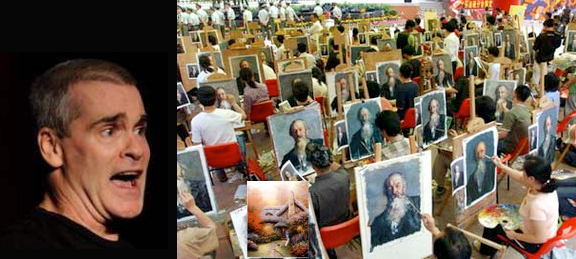Peasant Thoughts on "Art, Artists, Bigotry, Hate...and the Legacy of Thomas Kinkade" by Alan Bamberger
Some peasant thoughts on the following "Art, Artists, Bigotry, Hate...and the Legacy of Thomas Kinkade" by Alan Bamberger. (link to article located here and image below)
There are two sides to this coin. The misunderstood participants in the world of high/fine, really meaningful art is withheld from the mass kitsch mainstream. In part, with the idea that they are just closed minded and could never understand the depth of art. Also, to identify the genre as precious, exclusive and just plain mo better. Similar to that of a hipster subculture and with about as much depth.
There are two sides to this coin. The misunderstood participants in the world of high/fine, really meaningful art is withheld from the mass kitsch mainstream. In part, with the idea that they are just closed minded and could never understand the depth of art. Also, to identify the genre as precious, exclusive and just plain mo better. Similar to that of a hipster subculture and with about as much depth.
Aside from a personal definition, the haters and the lovers are all
exercising moral judgement. So, if one does come to the position of
hate, it is only relative to class genres (peasants or bourgeoisie),
fashion, commodity/accessibility, and presumed objectives. We will all
never agree to disagree and the reason is insecurity on all sides.
Plenty of Kinkade patrons hate contemporary art for many reasons. Kitsch
is accessible and fine/high art is mostly out of reach. This problem of
separatism is the foundation of all hate. Notions of self-esteem are
relative to being less than or more than the other. Never the same! We
are all equal. Humans, acting on the same stage, in different plays,
performing. Often times losing ourselves in the part.
The funny thing about this whole discourse is the idea there is actually a definition of art that everyone agrees upon.
art 1 |ärt|
noun
1 the expression or application of human creative skill and imagination, typically in a visual form such as painting or sculpture, producing works to be appreciated primarily for their beauty or emotional power: the art of the Renaissance | great art is concerned with moral imperfections | she studied art in Paris.
• works produced by human creative skill and imagination: his collection of modern art | an exhibition of Mexican art | [ as modifier ] : an art critic.
• creative activity resulting in the production of paintings, drawings, or sculpture: she's good at art.
2 (the arts) the various branches of creative activity, such as painting, music, literature, and dance: the visual arts | [ in sing. ] : the art of photography.
3 (arts) subjects of study primarily concerned with the processes and products of human creativity and social life, such as languages, literature, and history (as contrasted with scientific or technical subjects): the belief that the arts and sciences were incompatible | the Faculty of Arts.
4 a skill at doing a specified thing, typically one acquired through practice: the art of conversation.
The funny thing about this whole discourse is the idea there is actually a definition of art that everyone agrees upon.
art 1 |ärt|
noun
1 the expression or application of human creative skill and imagination, typically in a visual form such as painting or sculpture, producing works to be appreciated primarily for their beauty or emotional power: the art of the Renaissance | great art is concerned with moral imperfections | she studied art in Paris.
• works produced by human creative skill and imagination: his collection of modern art | an exhibition of Mexican art | [ as modifier ] : an art critic.
• creative activity resulting in the production of paintings, drawings, or sculpture: she's good at art.
2 (the arts) the various branches of creative activity, such as painting, music, literature, and dance: the visual arts | [ in sing. ] : the art of photography.
3 (arts) subjects of study primarily concerned with the processes and products of human creativity and social life, such as languages, literature, and history (as contrasted with scientific or technical subjects): the belief that the arts and sciences were incompatible | the Faculty of Arts.
4 a skill at doing a specified thing, typically one acquired through practice: the art of conversation.



Comments
Post a Comment